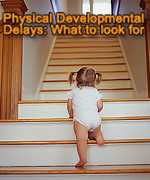Important Milestones: Your Child By Five Years
Milestone Checklist
How your child plays, learns, speaks, acts, and moves offers important clues about your child’s development. Developmental milestones are things most children can do by a certain age.
Check the milestones your child has reached by his or her 5th birthday. Take this with you and talk with your child’s doctor at every visit about the milestones your child has reached and what to expect next.
What most children do by this age:
Social and Emotional
- Wants to please friends
- Wants to be like friends
-
More likely to agree with rules
-
Likes to sing, dance, and act
-
Is aware of gender
-
Can tell what’s real and what’s make-believe
- Shows more independence (for example, may visit a next-door neighbor by himself [adult supervision is still needed])
- Is sometimes demanding and sometimes very cooperative

Language/Communication
-
Speaks very clearly
-
Tells a simple story using full sentences
-
Uses future tense; for example, “Grandma will be here.”
- Says name and address

Cognitive (learning, thinking, problem-solving)
-
Counts 10 or more things
- Can draw a person with at least 6 body parts
-
Can print some letters or numbers
- Copies a triangle and other geometric shapes
-
Knows about things used every day, like money and food
Movement/Physical Development
-
Stands on one foot for 10 seconds or longer
-
Hops; may be able to skip
- Can do a somersault
- Uses a fork and spoon and sometimes a table knife
- Can use the toilet on her own

- Swings and climbs
Act early by talking to your child’s doctor if your child:
- Doesn’t show a wide range of emotions
- Shows extreme behavior (unusually fearful, aggressive, shy or sad)
- Unusually withdrawn and not active
- Is easily distracted, has trouble focusing on one activity for more than 5 minutes
- Doesn’t respond to people, or responds only superficially
- Can’t tell what’s real and what’s make-believe
- Doesn’t play a variety of games and activities
- Can’t give first and last name
- Doesn’t use plurals or past tense properly
- Doesn’t talk about daily activities or experiences
- Doesn’t draw pictures
- Can’t brush teeth, wash and dry hands, or get undressed without help
- Loses skills he once had
If You’re Concerned – Act Early
Tell your child’s doctor or nurse if you notice any of these signs of possible developmental delay for this age, and talk with someone in your community who is familiar with services for young children in your area, such as your state’s public early intervention program. For more information, visit our "If You’re Concerned" web page or call 1-800-CDC-INFO.
The American Academy of Pediatrics recommends that children be screened for general development using standardized, validated tools at 9, 18, and 24 or 30 months and for autism at 18 and 24 months or whenever a parent or provider has a concern. Ask your child’s doctor about your child’s developmental screening.
“Learn the signs. Act early.” materials are not a substitute for standardized, validated developmental screening tools.
Adapted from CARING FOR YOUR BABY AND YOUNG CHILD: BIRTH TO AGE 5, Fifth Edition, edited by Steven Shelov and Tanya Remer Altmann © 1991, 1993, 1998, 2004, 2009 by the American Academy of Pediatrics and BRIGHT FUTURES: GUIDELINES FOR HEALTH SUPERVISION OF INFANTS, CHILDREN, AND ADOLESCENTS, Third Edition, edited by Joseph Hagan, Jr., Judith S. Shaw, and Paula M. Duncan, 2008, Elk Grove Village, IL: American Academy of Pediatrics.
- Page last reviewed: August 15, 2016
- Page last updated: August 15, 2016
- Content source:



 ShareCompartir
ShareCompartir